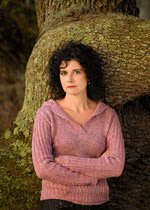What do you do when you finish a book or a story or an article?
If I'm not smack up against a deadline, I turn my attention to another project, even if only for an afternoon. (And sometimes that project is laundry and vacuuming, because these things tend to get neglected when I'm deep in the flow with my writing.)
When I come back to my project, I usually just read it, front to back. I'm a compulsive editor, so I do a little twiddling as I go, but I try to keep it to correcting typos and grammatical errors. Wholesale slicing and dicing can wait till later. At this point, I need to see my story as a coherent whole for the very first time...and this read-through is a very good way to spot the ways in which the story is not yet coherent, because it is essential that my early editing strategies are directed toward writing a story that makes sense.
Once I feel that the story is near its final form, I begin looking at the way I've told my story. Today's writing tip is focused on this stage.
Most modern fiction is constructed as a sequence of scenes, each told from a single point-of-view. A story of a day in the life of a ten-year-old, for example, might consist of a scene at the breakfast table told from the student's point-of-view, then a scene from his mother's point-of-view as she waves good-bye to her son getting on the school bus, then a scene from his morning spelling class and another set in the school cafeteria, both told from his point-of-view. And so on.
When I'm editing at the scene level, I read the piece with a single goal in mind: making sure every scene really needs to be there. I ask myself whether a scene advances the plot or deepens characterization or injects an important sense of realism by improving the reader's perception of the setting. If a scene that shows our hero eating Rice Krispies does none of those things, then it has to go, no matter how well I described that nutritious breakfast's snap, crackle, and pop. I'm not really happy unless a scene accomplishes more than one of my goals as a storyteller.
Remember...if a scene serves no function other than to highlight the beauty of your prose, then it doesn't get to stay. Make your lovely prose work for you. Make it tell your story!
Happy writing!
Mary Anna
Sometimes you really don't want to know how books are made.
Monday, July 5, 2010
Writing Tips for the Practical-Minded #11: Editing at the Scene of the Crime
Subscribe to:
Post Comments (Atom)
About Me

- Mary Anna Evans
- Mary Anna Evans has degrees in physics and engineering, but her heart is in the past. Her series character, Faye Longchamp, lives the exciting life of an archaeologist, and Mary Anna envies her a little. Faye Longchamp's growing list of adventures include Artifacts, Relics, Effigies, Findings, Floodgates and, coming in October, Strangers. Mary Anna is a co-founder and board member of the Anhinga Writers' Studio. The Studio presents an annual summer workshop in Gainesville, Florida, providing writing instruction and networking for fiction and nonfiction authors of all levels of experience. For information on this year's summer workshop, visit www.anhingawriters.org.
Followers
Blog Archive
-
▼
2010
(124)
-
▼
July
(26)
- I haven't been AWOL. I've been flying with the An...
- Writing Tips for the Practical-minded #30: Talk t...
- Making you wait a bit...
- Writing Tips for the Practical-minded #29: Reach ...
- Writing Tips for the Practical-minded #28: Get a ...
- Writing Tips for the Practical-Minded #27: Get ad...
- Writing Tips for the Practical-Minded #26: Lost i...
- Writing Tips for the Practical-minded #25: Get to...
- Writing Tips for the Practical-minded #24: Use yo...
- Writing Tips for the Practical-minded #23: Fictio...
- Writing Tips for the Practical-minded #21: My ima...
- Writing Tips for the Practical-Minded #20: I apol...
- Writing Tips for the Practical-Minded #17: You ar...
- Writing Tips for the Practical-Minded #19: There'...
- Writing Tips for the Practical-Minded #18: You ha...
- Writing Tips for the Practical-Minded #16: Thank ...
- Writing Tips for the Practical-Minded #17: Omit n...
- Writing Tips for the Practical-Minded #15: Please...
- Writing Tips for the Practical-Minded #14: Scarlet...
- Writing Tips for the Practical-Minded #13: Learn ...
- Writing Tips for the Practical-Minded #12: Wander...
- Writing Tips for the Practical-Minded #11: Editin...
- Writing Tips for the Practical-Minded #10: We Hol...
- Writing Tips for the Practical-Minded #9: Writer'...
- Writing Tips for the Practical-Minded #8: Because...
- Writing Tips for the Practical-Minded #7: Trust t...
-
▼
July
(26)














No comments:
Post a Comment